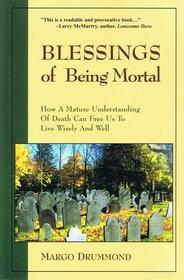Search -
Blessings of Being Mortal: How a Mature Understanding of Death Can Free Us to Live Wisely and Well
Blessings of Being Mortal How a Mature Understanding of Death Can Free Us to Live Wisely and Well
Author:
One hundred years from today, each of us, at best, will be a photograph, perhaps a name on a grave marker, or a mention in some obscure family history. Until then, why not be happy, while the chance to do so is still ours. Accepting the fact that we are going to die generates an acute awareness of the need to live in the present, says Margo Drum... more »
Author:
One hundred years from today, each of us, at best, will be a photograph, perhaps a name on a grave marker, or a mention in some obscure family history. Until then, why not be happy, while the chance to do so is still ours. Accepting the fact that we are going to die generates an acute awareness of the need to live in the present, says Margo Drum... more »
ISBN-13: 9781880823255
ISBN-10: 188082325X
Publication Date: 7/1/2001
Pages: 166
Rating: ?
ISBN-10: 188082325X
Publication Date: 7/1/2001
Pages: 166
Rating: ?
0 stars, based on 0 rating
Publisher: North Star Publications (MA)
Book Type: Paperback
Members Wishing: 3
Reviews: Amazon | Write a Review
Book Type: Paperback
Members Wishing: 3
Reviews: Amazon | Write a Review
Genres:
- Health, Fitness & Dieting >> Death & Grief >> General
- Health, Fitness & Dieting >> Self-Help >> General




